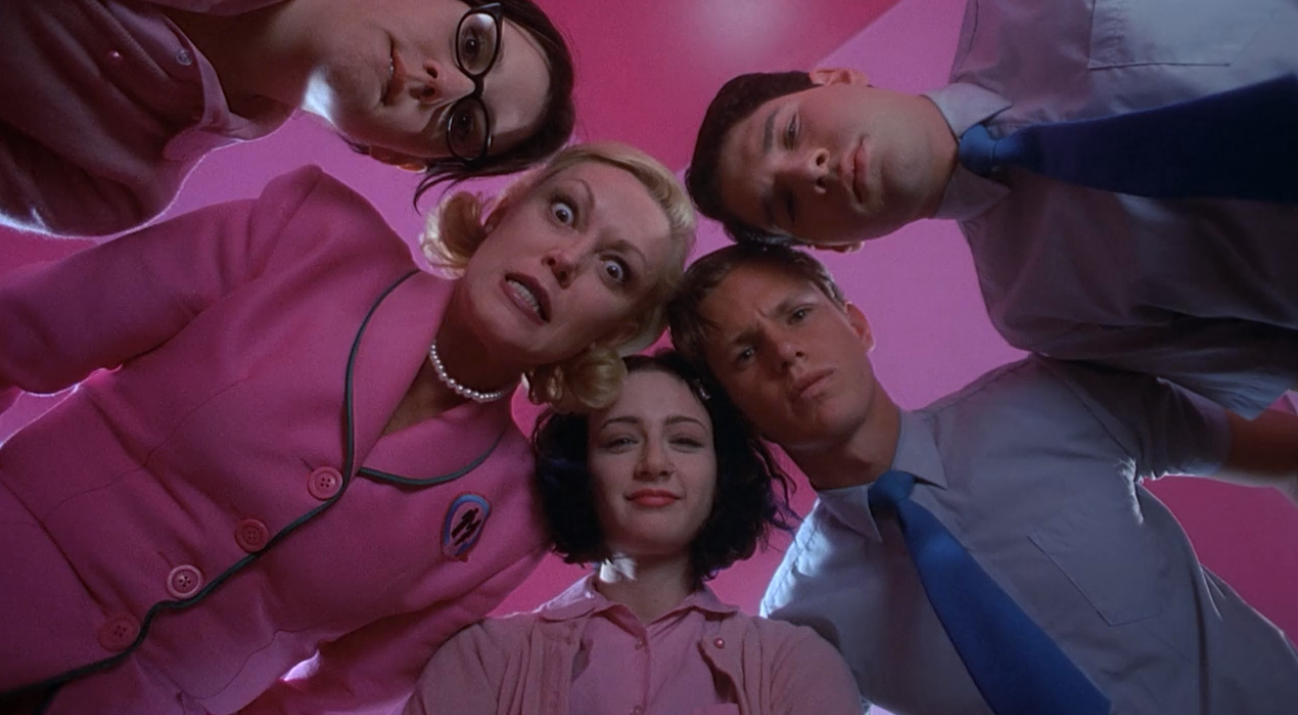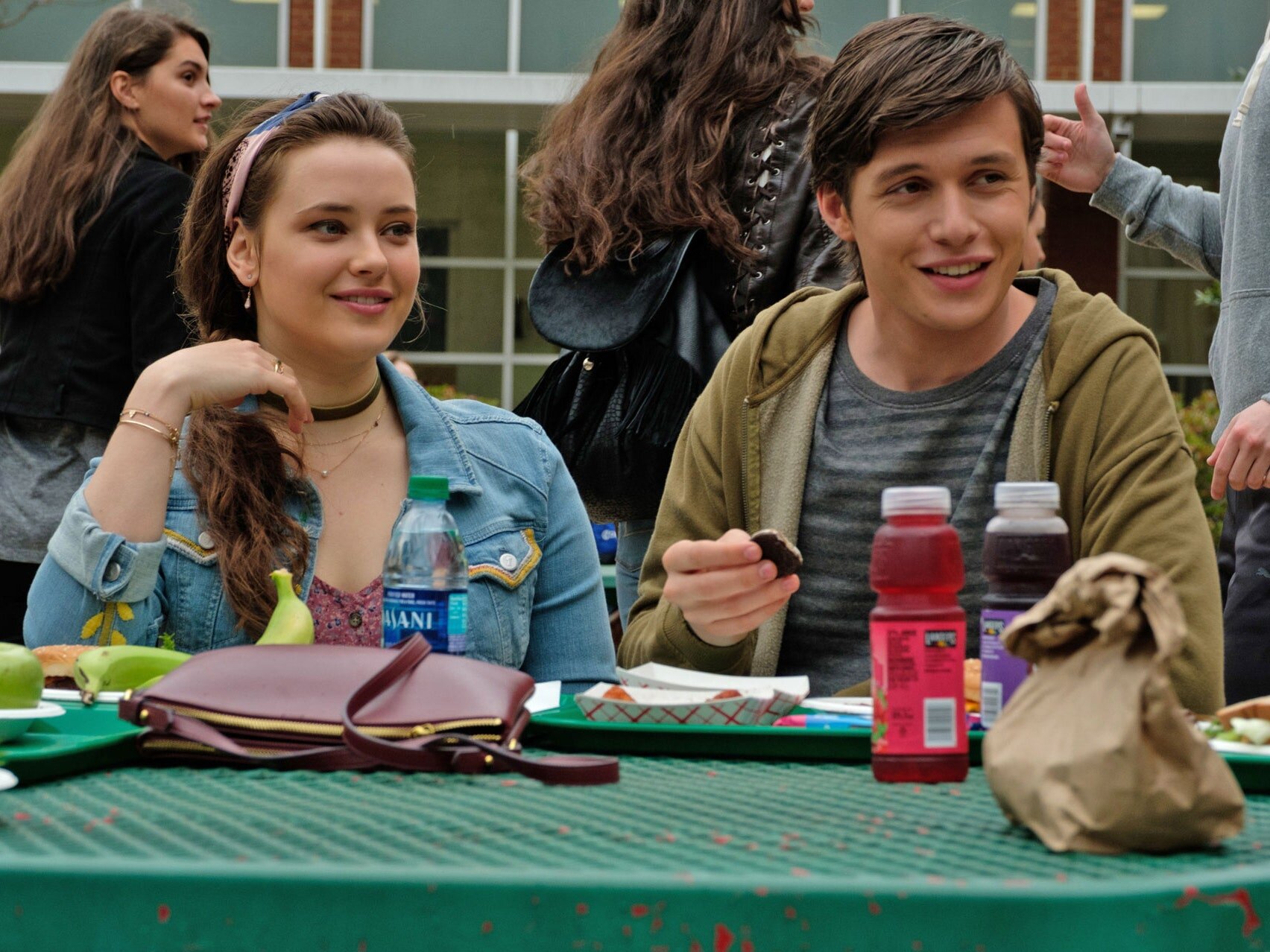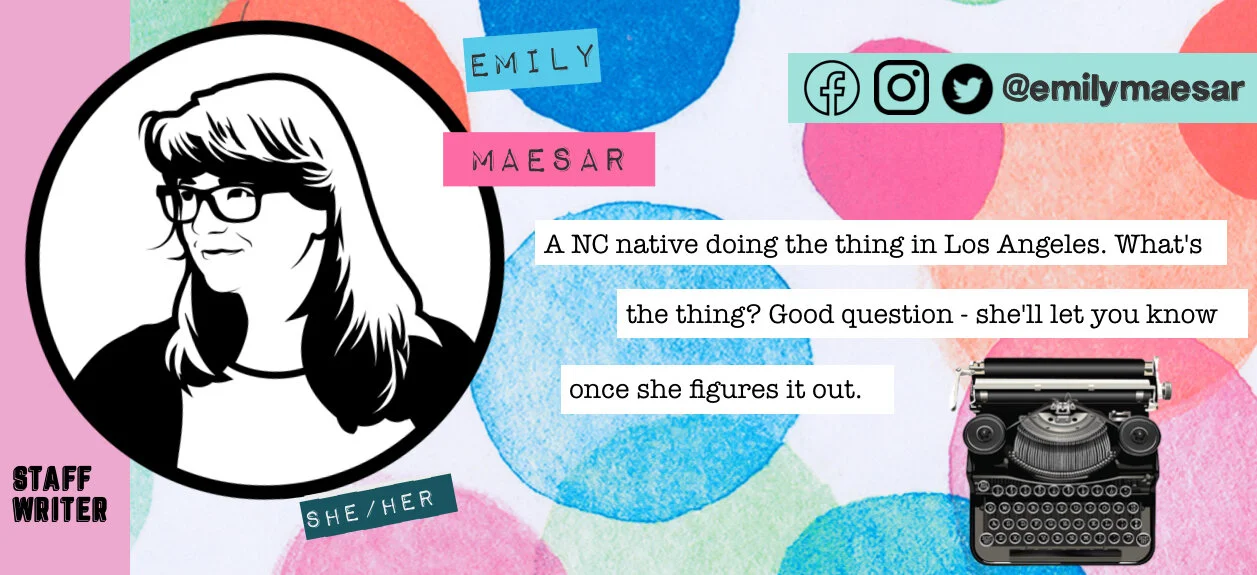You Can't Sit With Us: Coming Out
by Emily Maesar, Staff Writer
As June comes to a close, I figured now might be a fun time to chat about probably the newest genre of teen film to enter the scene: The Coming Out flick. These types of films are the babies of teen cinema and therefore there’s a lot of leeway that I know I’m willing to give them. Which is to say that queer teen cinema is almost completely comprised of coming out stories. I think this makes sense because of what’s actually going on with a lot of teenagers outside of their sexuality, but my leeway comes from the fact that coming out isn’t the only thing queer teens do these days. That being said, it is the predominant subject of queer teen cinema, so let’s talk about it!
The two films I wanted to chat about this month are certainly some of my favorites, but I also think they encapsulate different aspects of queer identity over an almost twenty year span of American cinema. We’re gonna talk about 1999’s But I’m a Cheerleader and 2018’s Love, Simon, because they both use the well-known trauma of being forced out to then create a sense of community and safety. Or, at least, how they try to. Your mileage may vary.
Written by Brian Wayne Peterson and directed by Jamie Babbit, But I’m a Cheerleader is about Megan Bloomfield (Natasha Lyonne). She’s a high school cheerleader with a handsy boyfriend, who’s very excited about a cheer trip and hanging out with all the girls. Until, that is, her parents and friends ambush her with a gay intervention and she gets sent to conversion camp for being a lesbian. There she’s forced to reckon with her identity as she falls for one of the other girls at camp, Graham (Clea Duvall).
Based on the very public conversion camp stories that were coming out en masse in the 90s (and still occur today, just much more quietly), Babbit and Peterson were both openly queer filmmakers who wanted to explore the social construction of gender roles and heteronomativity. How they’re enacted, in extremes, by the people at the camp, but also how seemingly “normal” people buy into the harmful attitudes of those extremists.
But I’m a Cheerleader is a campy comedy with over-saturated colors and outrageous costumes that’s satritzing a very real piece of trauma that many queer teens, particularly from conservative communities, face. I think it was always destined to be a cult classic among the queer film going population for this reason. Also, it’s just so damn funny.
However, But I’m a Cheerleader had to fight to get its R rating in the United States, as the MPAA tried their hardest to give it an NC-17, which is the death rattle for a film trying to get distribution, even to this day. The rating guarantees that teenagers truly can’t go to the theater to see the film. This is because an NC-17-rating means a film either won’t get shown at all, or the ID checking will be much more intensive than for a simple R-rating. Which means it’s even harder for the teen audience to see the film in the first place.
Babbit spoke in the 2006 documentary This Film is Not Yet Rated (truly great doc, by the way) about why she thought they’d given her the NC-17, as well as her fight to make it an R-rating. Her assessment, based on one of the scenes she eventually had to cut down, was that the MPAA had rated the film so harshly because of its queer sexual content.
Which is totally true! I think it was, and remains, a mix of sexual queer content and positive depictions of women’s sexuality. Mix it all together and a scene of Megan masturbating over her clothes gets you an NC-17. Which is wild because there really isn’t a whole lot of explicit sexual content in the film, actually. There’s no nudity and the fact that the previously discussed film American Pie, which came out the same year, was able to get an R-rating with its current cut is… yeah. It’s really telling.
Moving away from the late 90s R-rated overt sexuality to the late 2010s PG-13 Tumblr queer aesthetic, let’s talk about Love, Simon.
Based on the bestselling young adult novel Simon vs. the Homo Sapiens Agenda by Becky Albertalli, Love, Simon was written by Isaac Aptaker and Elizabeth Berger (who also showrun the spin-off series Love, Victor) and directed by Greg Berlanti. The film follows the aforementioned Simon Spier. He’s just like every normal teenager in the suburbs outside Atlanta… except he has a secret. He’s gay. When an anonymous student, known only as “Blue” comes out on Creek Secrets, a Tumblr-style blog made for all the gossip at their high school, Simon decides to create a fake identity and starts an email correspondence with him.
However, he can’t just be happy connecting with another gay student at his school. No, that would be too nice and easy. Martin, one of the other theater kids, finds his email correspondence with Blue. So, of course, his first instinct is to blackmail Simon by threatening to out him if he doesn’t help Martin hook up with Simon’s friend Abby.
Everything escalates from there and when Simon isn’t able to help Martin get with Abby because Abby simply doesn’t want to be with him, Martin outs Simon on Creek Secrets. Simon comes out to his family, his friends are pissed at him for a while (we’ll talk about this in a few), and he eventually decides to make a public post on Creek Secrets where he invites Blue to ride the ferris wheel at the fair with him. Which he does, and then they start dating.
So, that’s a lot of glossing over the main emotional bits of the plot, because trust me that if Love, Simon is a film that’s gonna hit you… it’s gonna hit you hard. Simon’s parents have two of the best “we love you for who you are” speeches. They’re both very different, but they both kill me every single time. I think it’s also a nice reminder that just because it might seem like that someone will have supportive parents… it doesn’t mean that coming out isn’t absolutely terrifying.
Now, something I’ve always loved about Love, Simon is the way the film explores Simon’s agency. That until Simon makes the choice to invite Blue to the ferris wheel, which I’ll remind you is at the end of the film, Simon doesn’t really get to make any choices about his life. In particular about coming out. Sure, he makes the “choice” to come out to his family, but he only does it because he’s already been outed to the community at large. Most of the choices, good and bad, that Simon makes are due to either society keeping him in the closet, or Martin blackmailing him. And while the blackmail bit isn’t probably a common occurrence for queer teens, the societal presure to stay in the closet is perhaps the experience that connects us all - more than almost anything else.
Also, gotta mention that all of Simon’s friends suck ass. I’m sorry, but they do. Abby is the only one who really has a leg to stand on in terms of being angry with him - but I’ll never stop being mad that all of his friends just end up abandoning him once he’s outed. Yes, he did some shitty stuff, but he did it because he was being blackmailed. The lack of empathy makes me feel like they weren’t really friends in a very distinct kind of way.
And maybe that’s not fair - I’m sure there’s something to be said for the selfishness of teenagers as it relates to his friends dropping him. That it’s a reflection of how much more internalized hurt matters to teens, rather than being able to look at the bigger picture outside of themselves. Which… sure. I understand that reading, and I think it’s valid. However, I would also argue that they’re modern teenagers and that these particular characters feel like they have the emotional maturity to at least listen to their closest friend’s plight.
Like, I’m not trying to argue that Simon’s actions during the blackmail were perfectly fine because of the circumstances, but I am saying that if they were really friends then they would understand why he felt like he needed to take the actions he did. They don’t have to forgive him, but maybe it’s not a great idea to completely drop your friend who was just very publicly outed and is being ridiculed by assholes at school because of it?
On that note, I know “best use of a PG-13 ‘fuck’” gets thrown around a lot. But, I legitimately think that Love, Simon has the best use of it’s single “fuck.” It’s cathartic, it’s emotional, and it’s Simon voicing for all of us the very base feeling of getting outed. And I’ll take that over a funny use of the single “fuck” any day.
Also, I’d be remiss if I didn’t just mention the fact that sometimes life imitates art, especially when it comes to queer issues like being outed. Which is to say that last year, in the middle of the pandemic, there was a lot of conversation about if people who don’t identify as queer should be able to make queer stories. Should they be able to profit off queerness? This was a general conversation, but was kind of started and pinned to Becky Albertalli, the author of the original novel. See, she’s out now as a bisexual woman, but that wasn’t always the case. She was seen as a heterosexual woman profiting off of queer stories and people were demanding she either come out or basically renounce her entire career. So, she came out. Because what else was there to do? And that’s… so fucking shitty.
But to talk about both films, But I’m a Cheerleader and Love, Simon are queer films that deal with coming out, losing your agency, and finding it again. But what do they tell us about actual queer teens? Well, I’d say quite a lot, especially about the queer teens who became the queer adults who made them. That’s right folks, both of these films fit into the category of films about teens that adults made for their former selves.
They’re also films about creating community through trauma, which is the speciality of any marginalized group. It’s something I think But I’m a Cheerleader does slightly better than Love, Simon (because of those friends being shitty and all), but it’s something that I think many queer teens and adults understand and connect to on a base level.
It’s why I can’t be mad that we’re still getting coming out films as the main queer teen film genre. There’s never a bad time to let a queer teen (or queer adult, for that matter) know that there’s a community out there for them, regardless of their home life. Regardless of how they feel right now, they will always be able to find their people.






